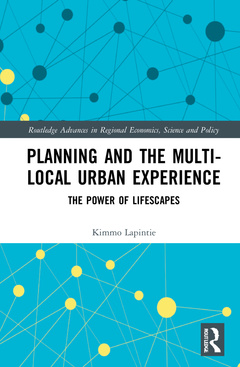Planning and the Multi-local Urban Experience The Power of Lifescapes Routledge Advances in Regional Economics, Science and Policy Series

The starting point of this book is the observation that there is a discrepancy between the lived reality of human beings and the fabricated, planned, and governed ?reality? of the state apparatus at both the local and national level.
The book posits multi-locality as an emerging spatial configuration. The author draws from various theoretical sources, such as Deleuze and Guattari?s concepts of state or royal science, the Nietzschean critique of idealism, Hägerstrnad?s time-geography, Hintikka?s theory of modalities, Lefebvre?s urban society, Castel?s network society, Foucault?s concept of heterotopia, and Bhaskar?s and Sartre's theories of presence and absence. He also discusses the implications of Faludi?s post-territorialist critique of planning and governance, and of the failure to operationalise the concept quantitively, basing his arguments in the lived experiences of multi-locals as well.
The novelty of the book is how it analyses multi-locality from such a wide theoretical perspective: what is the nature and meaning of the different multiple and coexistent places for people, and how is this spatial transformation related to their mobility, everyday practices, and work. How does the presence and absence of places form their identity and their citizenship? He also addresses the inconsistency between multi-locality and traditional statistics and the planning and governance practices based on the assumption of unilocality and discusses the implications of this incongruity.
The book will be of interest to scholars in urban studies and planning theory, as well as practitioners developing more adequate practices replacing outdated ones.
1. Introduction: Revealing the paradox 2. The epistemology of escape and predator epistemology: Knowing and failing to know multi-local spatiality 3. Modalities of power: What are the many places for their users, and who can use them? 4. Multi-locality as urbanization 5. The politics of territorialism 6. Political topology 7. The logic of presence and absence 8. Heterotopia of the body 9. The city of cyborgs 10. Conclusion: From places to lifescapes
Kimmo Lapintie is Professor of Urban and Regional Planning and Head of Research at the Department of Architecture, Aalto University, Finland.
Date de parution : 01-2024
15.6x23.4 cm
Date de parution : 05-2022
15.6x23.4 cm
Thèmes de Planning and the Multi-local Urban Experience :
Mots-clés :
Multi-locality; urban governance; urban space and place; spatial planning; urban and regional planning; Follow; Corporeal Human Being; Pause; Corporeal Human; Recreational Vehicle; Census; Berries; Strong; Independent; Contemporary Society; Summer Cottage; Face To Face; Wandering; Post-war; Dense; Corporeal Existence; Mobile Phone Data; Ok; Modal Logic; Smartphones; Tours; Ticketed; Sick; Metropolitan Mentalities; Alert
